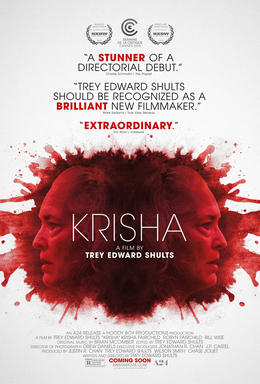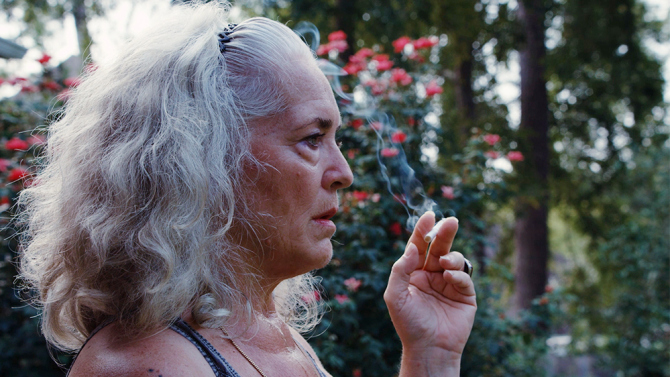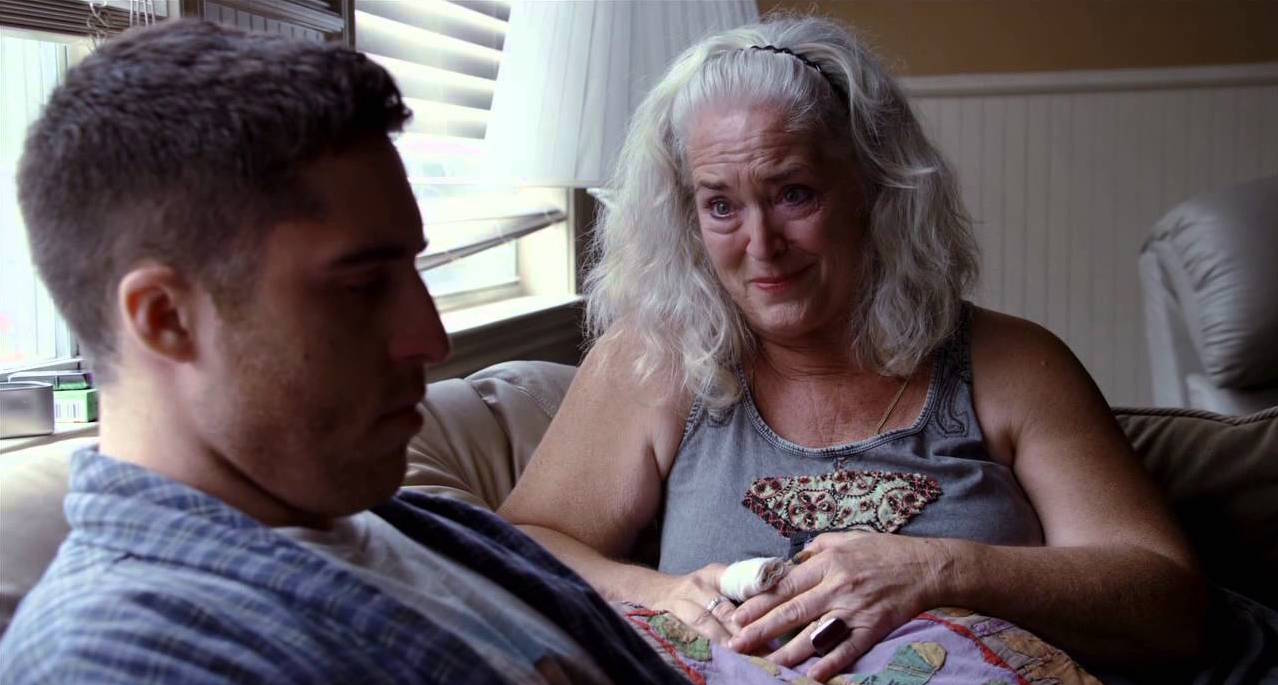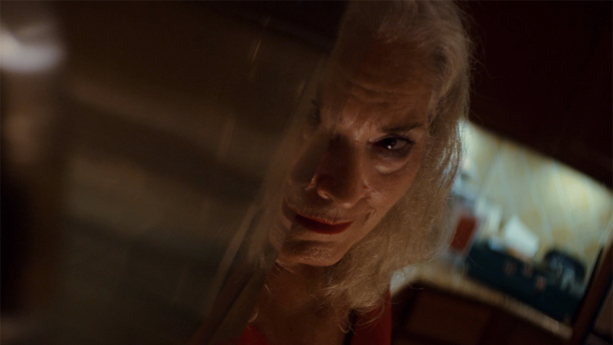 Nothing just moves in Trey Edward Shults’ disorienting debut Krisha; it sloshes, slips, tackles, and caws. A dizzying symphony of brain-clattering sound, feverishly unhinged camerawork, and a tightknit, ink-blotter ensemble led by the ferocious Krisha Fairchild, Shults’ get the family together for Thanksgiving drama shoots you right off your seat and holds you hostage over the darkest edge of the human id. Red onions notoriously make you weep but under Shults’ rack-focus eye, they make you want to hurl too. Such portent may lead one to expect a draining, inhumane slog through the mud.
Nothing just moves in Trey Edward Shults’ disorienting debut Krisha; it sloshes, slips, tackles, and caws. A dizzying symphony of brain-clattering sound, feverishly unhinged camerawork, and a tightknit, ink-blotter ensemble led by the ferocious Krisha Fairchild, Shults’ get the family together for Thanksgiving drama shoots you right off your seat and holds you hostage over the darkest edge of the human id. Red onions notoriously make you weep but under Shults’ rack-focus eye, they make you want to hurl too. Such portent may lead one to expect a draining, inhumane slog through the mud.
But that alone would be far too easy. This is an exhilarating hostage situation, not just by witnessing a filmmaker’s virtuosic warp over cinematic language but also by the hot cohesion of its richly observed and highly specific setting, and the barbed black comedy that comes along with it. It feels like home, which is to say, Krisha is the waking nightmare of reckoning yourself against the eyes and ears that know you best, a big hug from your aunt that just may choke you from the inside out.

Nearly every element in the film announces itself, but none more so than its red supergiant star: Krisha. We meet her in one long, unbroken take as she hauls her suitcase out of her pick-up and heads down a suburban street on a mission, scorching the earth with every step she takes. As she rolls her bag down the Texas asphalt, the camera follows right behind, fixed smoothly to her as she fidgets, talks to herself, and looks for the family home. By the time she finds it – after trespassing on a neighbor’s lawn, soaking her shoes in mud and blithely dragging that roller board across the grass – things start breaking as soon as she enters. She rings the doorbell and summons a cacophony of dog barks. The whole family’s waiting inside so smiles, hugs, and how-ya-doin’s blanket the warm foyer of this bright, shiny unit. But when her nephew Trey (Shults himself) brusquely enters the room and snubs a crestfallen Krisha, we meet the real dark, dank haunted house. For the first time in the shot, Krisha loses her rehearsed composure and the camera loses control with her, woozily teetering until a pill gets popped. She’s an unstoppable force of nature; three sheets to a hurricane.
Krisha’s been away for awhile, she’s been working on herself. Like preparing a turkey, she’s scooping out her bad parts, stuffing some good, yummy vibes back in, and placing herself in the oven until she’s good to have at the table. Whispers hint that something’s just not right with her. A black sheep with a shock of white hair, her arrival feels more like a confrontation over some unsaid fracture than a welcoming home. Back in her bathroom – her only private space in the house – she unlocks her prescription pill stash with a key she keeps around her neck. Mental illness and addiction politely abide, but who knows how long the chemicals will last until the demons take over. You root for her as a human to keep it together, but as an audience member, you know it’s gonna get good when it all breaks down. And, honey, girl does it ever.

There’s a reason the film takes her name and it’s not just because it’s her story; Krisha bears the shame, secrets, and sins of the family, a harbinger and carbon sink all at once. But unlike the rest of them, she’s the only one trying to make a change. Schults portrays family as a primal tribe, matter-of-factly atavistic in behavior and action. Slaves to instinct and vice, the men wrestle, jab, and lust in the pecking order that testosterone preordains. They all point fingers and speak to one another with toxic lucidity, perfectly portrayed in a slice and dice conversation between Bill Wise’s live fuse and Krisha’s open wound. Surrounded by trappings of contemporary comfort, three different television remotes can’t turn their primitive power off. It’s up to Shults to use the filmic levers around him and dial it up until the walls shake.
A simultaneous exercise in subjective expression and objective judgment, Shults conjures an epic maelstrom and channels it through Krisha’s eyes. As an avatar for the entire family’s bile, which is itself representative of the filmmaker’s unsavory view of the ties that bind, her psychological state is the perfect cinematic crystallization to capture this primordial brine. Overlapping dialogue surrounds her – influences abound in this thing, but Robert Altman is front and center – and its first hints of familial pressure set off a jilted, center-shaking score that sounds as if it was recorded on a xylophone of bones. The untethered editing disrupts time and space off any recognizable pole, shuffling timelines and continuity according to mental mood and character, discarding linearity for interdimensionality in the process. This often makes the dropped jaw revelations snap harder and the milieu feel more like a collection of catch-up memories. It offers you a seat at this family’s dinner table. You’d be wise to stand in the corner.

Through Krisha’s perspective, the camerawork feels like a carousel of frenetic hope and shame that unbolts a little bit further with every spin. Shults and his cinematographer Drew Daniels use every trick in the book to carefully pinpoint where our heroine stands; shifting aspect ratios when the world closes in, dolly zooming to taffy-pull the dread, extending slow-mo to ratchet the tragedy, calibrating quick cuts to flashy movements and long, long takes that just won’t end. Paired with Fairchild’s open faucet master class, they dance together in a midnight waltz that won’t end until the sun comes up. Fairchild’s performance is a wonder to behold and not something easily shaken. With so much on the page to scream to the rafters, she pitches inward and carries each internalized emotion on the baggy sleeve of her dress. Her steady unraveling is inevitable but her determination to change anchors each decision, even though we know she'll cut the rope. She’s a discovery but with her transfixing command, that’s almost irrelevant. It’s a safe bet that we’ll be talking about her for years.
A striking debut – and winner of last year’s South by Southwest Grand Jury and Audience awards – Shults wrote, directed, and edited the thing, and you can feel his stamp everywhere. Although it sweats with influences – the aforementioned ambling of Altman, the stark human faces of Cassavetes, the visual bravura of a young PTA, the acid-tongued digressions in dialogue and structure of Tracy Letts, the camera chases dogs on the ground like Malick – the work still feels singular. Bolstered by a cast that happens to double as his own family – and also filmed in his house – this familiarity helps ground the proceedings even when the filmmaking breaks the ozone layer. Which it frequently does. Between the gut punches and belly laughs, it’s hard to breathe. As far as auto-asphyxiation goes, it doesn’t get much better than this. A